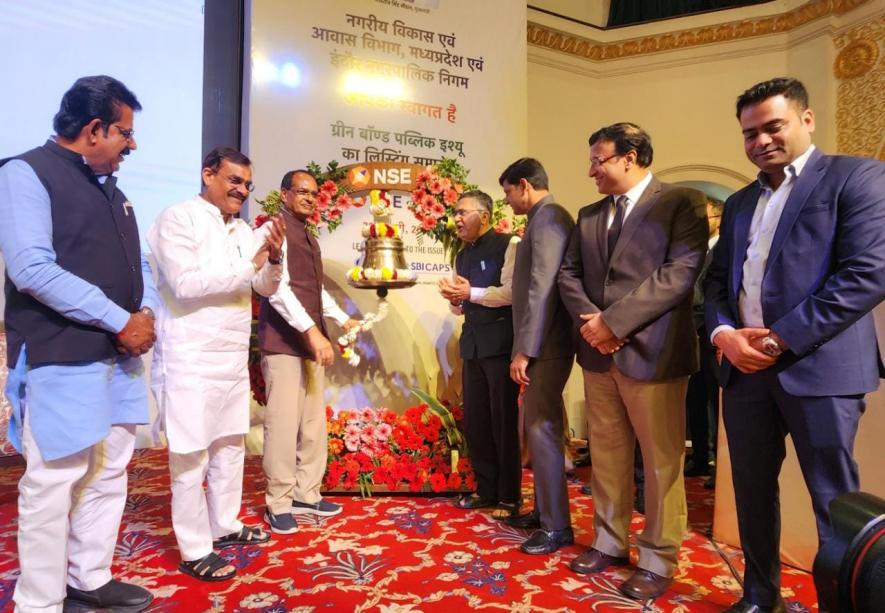MP: Indore Collects Rs 721 Cr Via Sale of Green Municipal Bonds, Aims to be India’s ‘First Solar-Reliant’ City

Bhopal: After performing well in waste management, the ‘cleanest’ city in the country, Indore in Madhya Pradesh, has embarked on a ‘path-breaking’ journey to become the first self-reliant solar city in India.
Toward this, the Indore Municipal Corporation came up with a 'green bonds' initiative for a public issue to fund a 60 megawatts solar power project worth Rs 305 crore. The bonds gave an alternate way of funding to civic bodies, reducing the dependency of corporations on Central and state grants for big projects, say officials.
According to the Indore Smart City Development Limited (ISCDL), Indore Municipal Corporation (IMC) has been spending Rs 300 crore a year (Rs 25 crore a month) on electricity to supply Narmada drinking water from neighbouring Khargone's Jalud pumping station, which is 80-km away from the city.
To cut down the expenses, the civic body came up with a plan to build a 60 MW solar power plant at Jalud pumping station at the cost of Rs 305 crore. The corporation received a subsidy of Rs 62 crore from the Union Ministry of New and Renewable Energy and the Union Ministry of Housing and Urban Affairs under two different schemes.
But to raise the remaining Rs 242 crore, the corporation introduced a public issue of ‘Green Bonds’ on the lines of Uttar Pradesh’s Ghaziabad Nagar Nigam(GNN). The GNN had issued India’s first green municipal bond for setting up a ‘tertiary water treatment plant’ worth Rs 150 crore.
A week after the Union budget 2023-24, which a push to the green energy sector, the IMC's green bond initiative got an overwhelming response. Against the required amount, the IMC attracted a subscription of Rs 720.75 crore from the green bonds. It was an oversubscription of 5.90 times the base price.
Green bonds are debt securities issued by a public or private organisation to finance or refinance projects that positively impact the environment. It opened for subscription between February 10- 14 with a base size of Rs 122 crore and an additional option to retain oversubscription for up to Rs 122 crore.
The phrase “oversubscription" refers to a situation in which there is a higher demand for fresh stock than there are real shares available.
"The rate of return, brand value of Indore and stable fiscal strength of the corporation which has a surplus budget close to Rs 700 crore are the key reasons for the overwhelming response of green bonds," Divyank Singh, Chief Executive Officer (CEO) of Indore Smart City Development Limited told the media.
He said the tender for the project has been floated and it will take 18 months to complete. "We will approximately cut down Rs 50-60 crore a year from electricity expenses once the power station begins functioning," he said, adding that "more importantly, it is going to pave the way for more such green projects and explore innovative financing methods."
According to Singh, green bonds are the future of municipal corporations as they not only promote green initiatives but will also make corporations self-reliant and self-sustainable in terms of money to fund big projects. "We could have taken a loan of Rs 250 crore for the project showing our robust fiscal status. But we wanted public participation. Therefore, we came up with an idea to raise money from the market," he said.
The CEO also pointed out that the key reason for the good response was the timing as it was started just after the Union budget, wherein municipal bonds were given huge importance.
In the recently presented Union Budget 2023, several measures for the energy-intensive sectors, such as agriculture, transportation, housing and infrastructure, and manufacturing were taken. Investments earmarked for energy transition or net zero initiatives have been given the largest allocation of Rs 35,000 crore, and the hydrogen mission, a “path-breaking” policy initiative, received Rs 19,700 crore for the production of five million tonnes of green hydrogen by 2030.
Indore has already earned Rs 10 crore by trading carbon credits in the global market since 2018, Singh said.
On February 21, the National Stock Exchange (NSE) listed the first green bonds on its platform from Indore Municipal Corporation.
In the official communique, NSE said that municipal bonds provide an alternative means of financing for urban local bodies, reducing dependence on central and state grants. Most urban infra bonds may be categorised as green bonds given that proceeds are predominantly targeted toward energy, transport, water management, sewage treatment, energy saving and so on. Green municipal bonds also aim to bring in new foreign investors who specialise in sustainable financing for investment in projects with environmental, social and governance considerations.
To mark the event, Madhya Pradesh Chief Minister Shivraj Singh Chouhan rang the bell at a ceremony after IMC’s green bonds were listed on NSE on Tuesday at the state capital. Chouhan also announced that Madhya Pradesh government plans to raise funds through green bonds in five more cities along similar lines.
On the question of future plans to make Indore a green city, Divyank Singh said: "We are also planning to set up a 40 MW solar power plant to boost other sectors. Also, we are moving ahead with a plan to formulate a new solar policy for Indore city. Our target would be to provide green power to 30% of the households. We will also incentivise rooftop solar power to promote green energy."
(With PTI inputs)
Get the latest reports & analysis with people's perspective on Protests, movements & deep analytical videos, discussions of the current affairs in your Telegram app. Subscribe to NewsClick's Telegram channel & get Real-Time updates on stories, as they get published on our website.
























